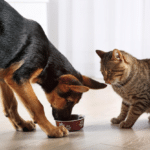Why Are Cavalier Charles Puppies So Popular?
Cavaliers are bred primarily as companion dogs. They love people and other animals. They also make excellent therapy dogs.
However, if you get one, find a breeder who does yearly heart testing. This is important because Cavaliers are prone to early onset Mitral Valve Disease, which leads to heart failure. They also have a risk for syringomyelia.
Affectionate and Loyal
As companion dogs, Cavalier King Charles puppies love the company of their people. They do not thrive in solitude and become upset when left alone for long periods.
They get along well with children and other pets as long as they are properly socialized from a young age. They also adapt well to city living as long as they get daily exercise and mental stimulation.
Their calm demeanor makes them popular as therapy and emotional support dogs for older people. Their soothing presence and manageable size make them great companions for seniors in nursing homes, providing comfort and a social connection that many residents may lack. Cavaliers are prone to genetic health conditions, including mitral valve disease and syringomyelia, but responsible breeding and routine veterinary checkups help mitigate these risks.
Affectionate and Adaptable
As a breed, the Cavalier is incredibly social and gets along well with other pets, children, and adults. They make great family dogs, although small kids should be supervised since they may play too rough. They also enjoy being lap dogs, making them perfect companions for senior owners.
These sweet-natured pups are a good choice for first-time dog owners because they tend to be less demanding than other breeds. However, they require regular grooming and lots of together time to prevent separation anxiety.
The Cavalier is prone to heart conditions like mitral valve disease, luxating patellas, and hereditary eye problems (cataracts and retinal dystrophy). They can also develop the neurological disorder syringomyelia, which causes fluid-filled areas around the spinal cord.
Affectionate and Smart
They want to please their people and do well with children and other dogs. Because of this, they are great for new dog owners or those who have never owned a dog before.
They do best in a family environment where they can get plenty of human interaction and playtime. They can live in small apartments if given enough exercise but will not do well if left alone all day.
Cavaliers are prone to various health issues, including syringomyelia (SM), heart murmurs, cataracts, and patella luxation. A responsible breeder will always screen their dogs for these conditions. Cavaliers also require early education on walking correctly on a leash to avoid damaging their skeletal frames. They love to go on walks with their humans and enjoy sniffing everything that comes their way.
Affectionate and Easy to Train
Cavaliers are easy to train as a breed and want to please their people. They respond well to gentle, positive training and thrive in obedience classes. They also excel in agility and other canine sports.
They need moderate exercise, including daily walks or time to play indoors or outside in a fenced yard. Their spaniel heritage means they enjoy sniffing out birds and other animals, but they must be kept on a leash to prevent them from running off and getting lost.
Like other small dogs, Cavaliers are prone to specific health problems such as eye conditions, knee and hip issues, ear infections, gastrointestinal disorders, and mitral valve heart disease. They are also susceptible to Syringomyelia (SM), a painful condition where a malformation in the spinal cord compresses the brain and causes fluid-filled areas near the brain.
Affectionate and Active
Cavaliers love to play and enjoy a good game of fetch. They also enjoy a good stroll around the block or a trip to the dog park. They get along well with other dogs and children as long as they’re socialized from a young age.
They’re also natural hunters and will want to explore the outdoors, so a fenced yard is essential. If they spot a bird in the distance, they’ll happily run after it. So, make sure they’re on a leash at all times!
While most Cavaliers live comfortably into old age, this breed is prone to health issues, such as mitral valve heart disease and syringomyelia. Responsible breeders will health-test their breeding stock for these conditions, so be sure to ask about this.




